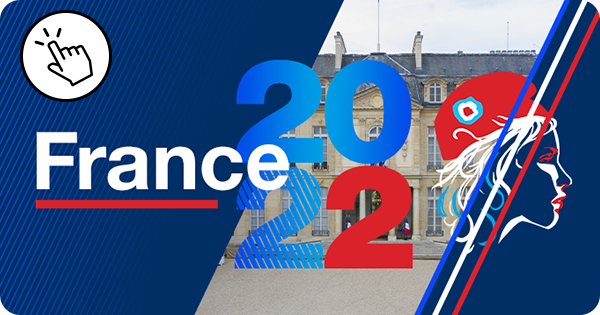French presidential candidates must collect 500 signatures, known as parrainages, from elected officials in order to run for the Élysée Palace – a hurdle that is hard to overcome for lesser-known candidates. Three of them, Hélène Thouy, Anasse Kazib and Georges Kuzmanovic, tell FRANCE 24 about their difficulties.

Every week, on Tuesday and Thursday, France's Constitutional Council releases the number of signatures collected by each candidate. On February 10, Anasse Kazib of the Révolution permanente (Permanent Revolution) party had 99 signatures, animal welfare activist Hélène Thouy had 56 and sovereignist candidate Georges Kuzmanovic had 27. Their names may be unknown to the general public but they are vying to be official candidates in the 2022 presidential election.
For them, as for all aspirants to France's top job, the first hurdle to overcome is to collect the 500 signatures from elected representatives – be they mayors, senators or local councillors – required of presidential candidates.
The system of 500 signatures was created to avoid the multiplication of candidacies and, in particular, weed out those deemed too eccentric. In April 2016, a new law modified the rules for collecting the signatures, which were previously anonymous. Since the 2017 presidential election, the identity of the elected representatives who back each candidate is made public, with the Constitutional Council releasing the list on its website. This has made it even harder for candidates to persuade potential sponsors.
‘No time to campaign’
"It is an exhausting task. Above all, it blocks us from everything else. That’s because while we're busy collecting sponsorships, we don't have the time to campaign," Hélène Thouy told FRANCE 24.
Thouy’s party, the Parti animaliste, has established itself in the political landscape in recent years. It won 64,000 votes in the 2017 legislative elections, thereby securing public funding of 90,000 euros per year. The party then took 2.17 percent of votes cast in the European elections of 2019. Yet, Thouy is still far from the required 500 signatures.
"Today, 84 percent of French people say that the animal cause is important to them and 47 percent say the candidates' proposals on this subject could influence their vote. This is huge. But because of the current system and, in particular, the lifting of the anonymity of the backers, it has become even more complicated for a small party like ours to emerge", she said.
‘We are exhausting our activists’
Candidates who are struggling to obtain the 500 signatures say mayors – traditionally the most numerous contingent of potential sponsors – are under pressure not to give their signatures to ‘small’ candidates who might hinder the ‘big’ ones.
"Our system favours four or five institutional parties and only aims to prevent the existence of inconvenient candidates. Because in reality, candidates who are not serious don't even try to get their sponsorships," Kazib told FRANCE 24.
"It's obvious that a filter is needed. However, for smaller groups with fewer resources, there is not enough time to collect 500 signatures. And the fact that mayors have to send their signatures themselves creates a number of risks for error“, added Kuzmanovic, a former close associate of leftist firebrand Jean-Luc Mélenchon.
Winning this race against time requires organisation and strategy. Using data from past elections, candidates and their staff can draw up a map of municipalities that tend to provide most sponsorships. They also elaborate a typical profile of the elected official most likely to give his or her signature
Teams of volunteers are then dispatched across the country to knock on the doors of mayors. "It's a very time-consuming job that requires a lot of human resources," said Kuzmanovic. "We're exhausting our activists."
Compounding their difficulties, most "minor" candidates are not political professionals, meaning they have to juggle work and campaigning. While Kuzmanovic, currently unemployed after being fired in September 2021 from the company Ubisoft, has free time, Kazib works for the national railway company, the SNCF, and Thouy is a lawyer.
'Flagship election'
Despite the many obstacles, the three candidates are hopeful they will reach the goal of 500 signatures. While they have no illusions about their chances of victory, taking part in the official campaign would enable them to gain publicity and, above all, propagate their ideas.
“This is the flagship election of our democracy, the one where the major issues are debated and which will set the major stakes for the years to come," Thouy stressed. “So, in order to make the defence of animals a central issue, we must be present at this election. The vast majority of people do not know us. But as soon as we are given the same speaking time as the other candidates, our message will gain visibility.”
“I think we need a new far-left candidate who brings a breath of fresh air in the current times," added Kazib, for whom other far-left candidates "have a defeatist and routine discourse for the working class. I bring a renewal that arouses enthusiasm in my meetings, especially among young people and abstentionists. It’s just that the French people don't know it because candidates like me are made invisible by the media."
The challenge for these ‘minor’ candidates is also to put themselves in a favourable position for the June legislative elections, the results of which will determine the amount of public funding parties are entitled to over the next five years. Pounding out their message during a national campaign, taking part in televised debates alongside the outgoing president, Emmanuel Macron, and the likes of Valérie Pécresse or Marine Le Pen, can therefore help to garner votes in June.
For Thouy, Kazib and Kuzmanovic, the presidential election could serve as a spotlight for their ideas – provided, of course, they pass the 500 signatures hurdle.
This article has been translated from the original in French.







